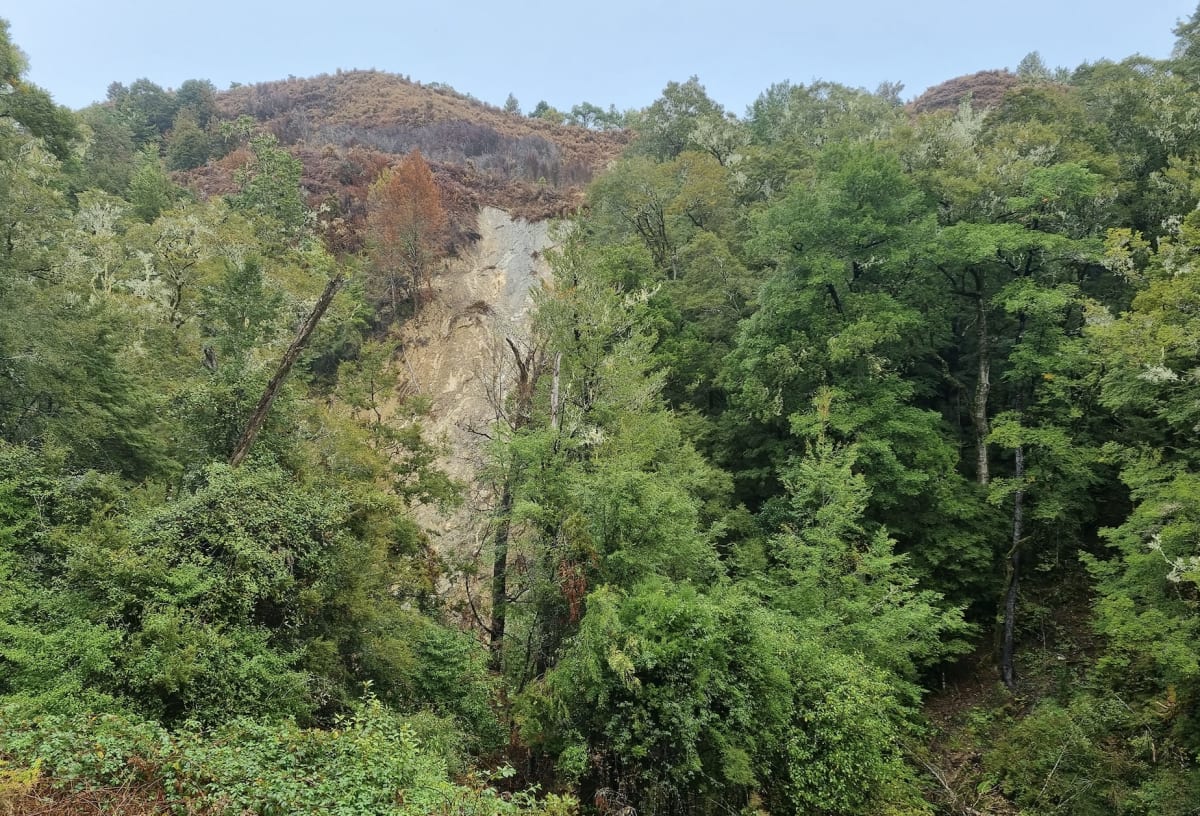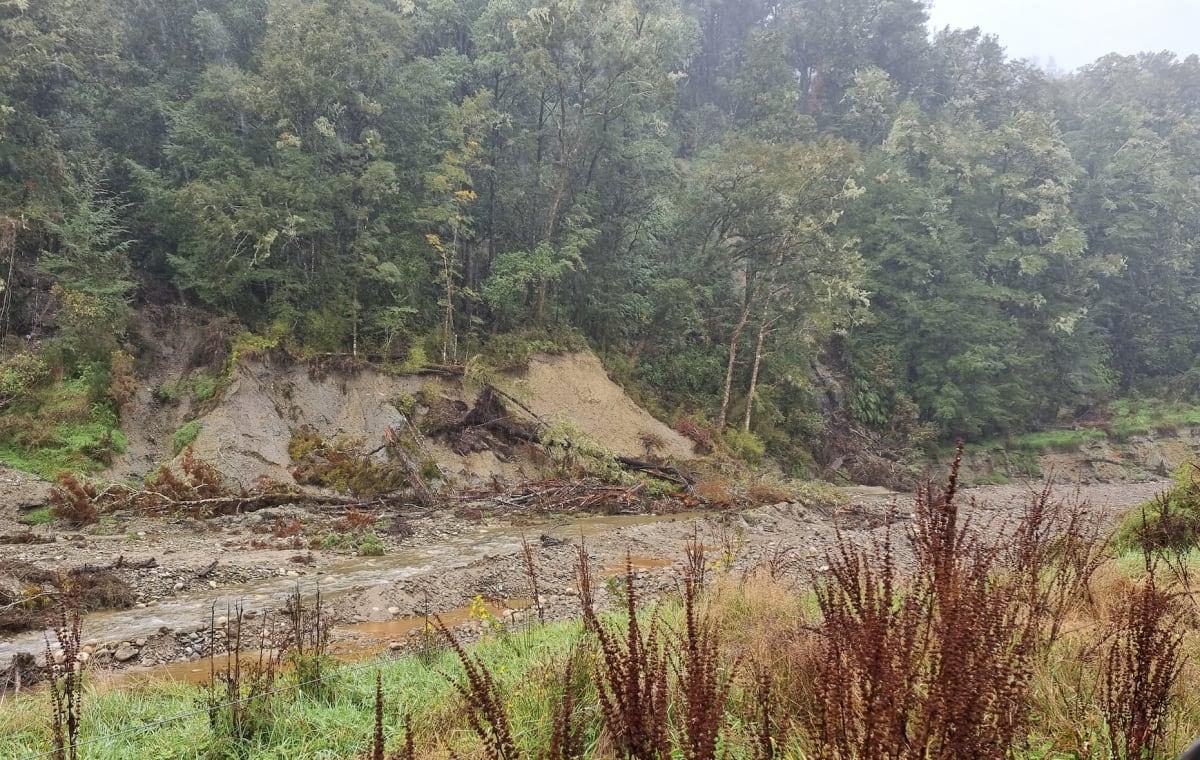
West Coast landowners hit by piles of flood debris were then hit with a council notice for clearing it from a nearby stream, highlighting bureaucratic problems as climate change causes more severe weather events.
West Coast Regional Council chair Allan Birchfield is calling for a more “common-sense” approach to prosecuting landowners trying to clear flood debris.
Inangahua farmers Dave and Pat Russell called Birchfield in desperation after dealing with slips, wrecked fences and loose cattle in February’s Buller floods.
The last straw was coming home to find an inspection notice from the council on a neighbour’s digger parked up in one of their damaged paddocks, Pat Russell says.
The couple in their 70’s had been through hell, Russell says.
“Our hills were falling into the creeks, we had to evacuate; there were huge slips everywhere and then we get a warning notice two weeks later because the creek’s discoloured at Boatmans downstream.”
The Russells were helped in the flood emergency by a local goldminer who used his digger to push the raging creeks back into their beds, and restore the rock banks, saving winter crops and pasture.
And by the time the council inspector arrived their creeks were running clear again, Pat Russell says.
“Our neighbour had done a bloody good job saving our land and then he finds this notice on his digger about not working in a riverbed – he was pretty upset.”
The council had acted on a complaint from West Coast Fish and Game manager Dean Kelly who had noticed Boatmans Creek running dirty when other waterways were running clear.
“Our role is to monitor the impact of river works on the game fish, and we wanted the council to investigate, but we heard nothing back.”
Fish and Game has no problem with landowners repairing flood damage, but does have concerns about the extent of work being done on West coast rivers under ‘emergency’ provisions, Kelly says.
“We understand the problem but some people take advantage and substantially change the course of a river turn them into channels and the work can go on for weeks. That’s not great for fish life.”
Rivers need to be left in a ‘decent’ state, and not turned into channels, Kelly says.
“Our role is to monitor the impact of these works on game fish - and fish need pools and clear water to thrive.”
Under the WCRC’s Land and Water Plan, landowners can reinstate riverbanks eroded by a flood as long as they take steps to minimise the release of sediment.

“It’s a permitted activity in an emergency – that’s the rule we were relying on.”
But when she rang the council to complain about the inspection notice, matters escalated, Russell says.
“They started talking about gravel extraction permits and how we should have notified the council about the work . But that’s rubbish – we weren’t extracting gravel and there’s nothing in the rule about notifying the council.”
The Russells – by now stressing over a potential fine, appealed to council chair Allan Birchfield who drove up to the Cronadun farm with his daughter - council engineer Paulette Birchfield - to take a look.
They concluded the Russells had done what was needed to get the creek back within its banks.
“You’re allowed to clear flood debris. The rules about protecting waterways and resource consents and keeping diggers out of creeks don’t apply when you have to act to save your land.”
The Russells have heard no more about from the council about the incident and Pat Russell thinks it’s because she ‘made a fuss’.
“It really did feel like a kick in the teeth. We’d spent weeks trying to fix the flood damage, get some fences up, chasing up the cattle ... and then we get a ticket.”
Fish and Game’s Kelly says he reported the muddied water at Boatmans after spotting it two weeks after the floods, when every other waterway in the area was running clear.
“We understand the problem but some people take advantage and substantially change the course of a river and the work goes on for weeks. That’s not great for fish life.”
With events like the February floods becoming alarmingly frequent, the council needs a clear policy on what landowners can and can’t do in an emergency, Russell says.
“There should be a plain English sheet that tells you where you stand so you’re not getting confusing messages from council staff to add to your troubles.”
It’s a view Birchfield agrees with. At a recent council meeting he warned it was not a good look for council’s compliance and engineering staff to be at odds.
“We have talked about this in a meeting with staff present. We can’t have river engineers being OK with emergency work and then the compliance team coming in and slapping the landowners with a ticket. It confuses the hell out of everyone.”
While the Russells have escaped prosecution, a Barrytown landowner who took similar action to protect his property last year was not so lucky, Birchfield says.
“We prosecuted him after he cleared flood debris from the mouth of Fagans Creek, then went on up the creek and cleaned things up. I was totally opposed to that prosecution and I told the staff that.”
The incident was the trigger for Birchfield’s falling-out with the council’s then chief executive Vin Smith who resigned after just seven months in the job.
And it’s a potential conflict that’s not going away any time soon.
All over the Buller, the February deluge washed great chunks of the bush-covered hills that line its valleys, into the streams below destabilising more of the steep cliffs in the process.
“There’s heaps more just waiting to come down with the next big rain,” Pat Russell says.

“You can see one slip, there’s an old miner’s hut that’s slid halfway down the slope – we didn’t even know it was there.”
So far the summer flood has cost the Russells $100,000 in repairs.
“That was our retirement nest egg, and now it’s gone, and there’s more to come.”
The massive damage now being caused by floods and storms on the West Coast has been caused in part by earlier events like Cyclone Fehi, Birchfield says.
“The trees that were knocked over then are rotting now and the slips with all the debris are moving down the valleys and the coastal strip where the farms are.”
And private landowners are increasingly footing the bill for clearing the mess wrought by nature – much of it on conservation land, he says.
“The Regional Council doesn’t have the funds to deal with this ... We just don’t have the income. But the least we can do is not sock them with penalties for the clean-up.”
* Made with the support of the Public Interest Journalism Fund *








